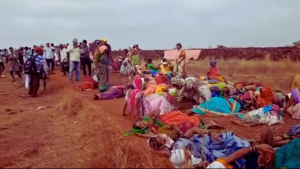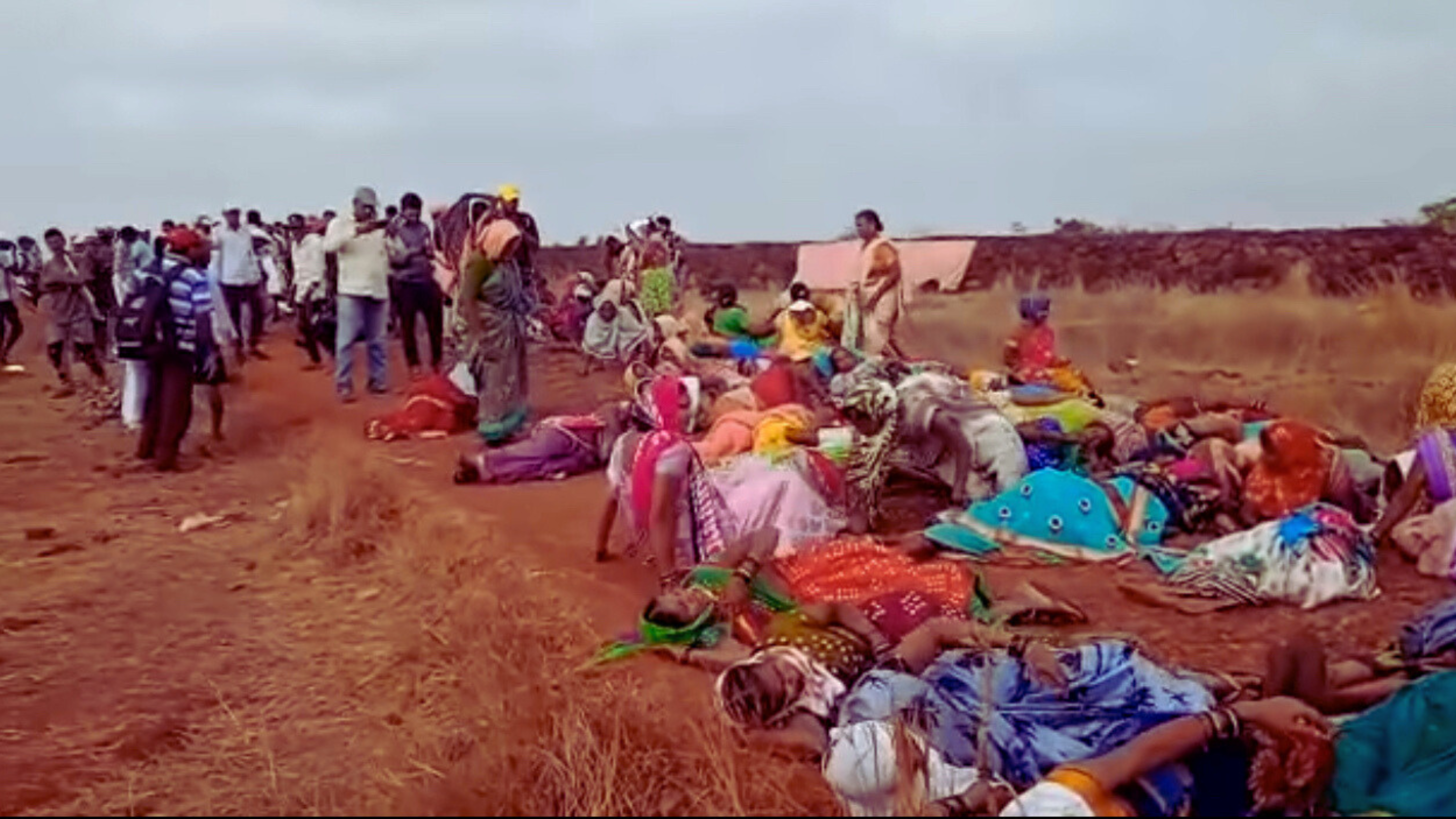 In the last week of April, the situation in Rajapur tehsil, Maharahtra turned tense in the context of the RRPCL project and people’s resistance to the project. Local activists were detained under false pretence. Women protestors blocked the roads. Police tear gassed and arrested the protestors opposing the Ratnagiri Refinery and Petrochemicals Limited (RRPCL). Still the news eludes many of us as the Maharashtra government has started oppressive measures to conduct land surveys and soil testing at the RRPCL project site in Barsu, Rajapur tehsil. This is not the first time when protests against the RRPCL intensified in the region. Earlier in 2019 the community successfully stalled the project at Nanar.
In the last week of April, the situation in Rajapur tehsil, Maharahtra turned tense in the context of the RRPCL project and people’s resistance to the project. Local activists were detained under false pretence. Women protestors blocked the roads. Police tear gassed and arrested the protestors opposing the Ratnagiri Refinery and Petrochemicals Limited (RRPCL). Still the news eludes many of us as the Maharashtra government has started oppressive measures to conduct land surveys and soil testing at the RRPCL project site in Barsu, Rajapur tehsil. This is not the first time when protests against the RRPCL intensified in the region. Earlier in 2019 the community successfully stalled the project at Nanar.
The RRPCL was first announced in 2015 as a joint venture between three Indian public sector oil refiners: Indian Oil Corporation Limited, Bharat Oil Corporation Limited and Hindustan Petroleum Corporation Limited, and two foreign oil companies Saudi Aramco and Abu Dhabi National Oil Company. With the output capacity of 60 million tonnes per annum, RRPCL would be the world’s largest single integrated refinery cum petrochemical complex. Planned over 15,000 acres of land across 17 villages in Nanar, the project met with fierce opposition from local farmers, fisherfolk, community leaders and local environmental activists. This forced the Shiv-Sena government to shelve the project at Nanar, and they relocated it to Barsu Solgaon which is around 20 km from Nanar.
Citing the reason that the RRPCL project at Barsu Solgaon won’t lead to the physical displacement of villages, the project proponents and government deemed Barsu Solgaon suitable for the project. However, the local communities fear that they will lose their land and the refinery would cause severe environmental impact on local flora and fauna, including on the water bodies and marine habitat. The project is going to affect 11 villages which include Barsu Solgaon, Goval, Panhale, Gothane, Nate, Shivne Khurd, etc. The state government of Maharashtra on the other side believes that RRPCL will bring development in the Konkan region and generate thousands of jobs.
Uday Samant, the Industries Minister, has been trying to revive the RRPCL at Barsu. The project was planned to be commissioned by 2023, but the delay in implementation has increased the cost of the project from US$ 40 million to US$ 70 million. In 2022, the government had started conducting drone surveys in Barsu which were stopped by local communities.
The community members and the local activists had apprehensions that the government will begin a land survey at Barsu Solgaon in April. These surveys will be used to prepare the pre feasibility report for the RRPCL.
On April 22nd, local environmental activists Satyajit Chavan and Mangesh Chavan were arrested in the garb of an investigation surrounding the daylight murder of reporter Shashikant Varishe. On April 23rd the government deployed a large contingent of police personnel in Barsu Solgaon, Taluka Rajapur, District Ratnagiri in preparation to conduct soil testing and land survey. However, later Anti Terrorism Squad officials confirmed that they didn’t not find anything against Satyajit but kept him in custody. This is the blatant use of State power to suppress and intimidate the local activists.
The other local leaders and activists were served with externment notices from Rajapur taluka from 24th April 2023 to 31st May 2023. In one of the videos posted online, a local farmer shared how the externment notices were served to people at the stroke of midnight. “I live in the jungle and the police entered my house at mid-night. My wife was alone at home. When police left, she felt dizzy and fell down”, he said while speaking to reporters.
To crush the opposition against the land survey and drilling, strict curfew was imposed in Rajapur taluka. Section 144 was imposed in Rajapur from 24th April 2023 to 31st May 2023. Despite all the oppressive measures, the women came out to protest. On 24 April, villagers, especially women, reached the proposed project site to stop the survey and were determined to stay there until the government withdraws the survey. The police destroyed the tents that women had pitched to protect themselves and children against scorching heat. Three local women suffered heat stroke but as police had blocked the road they couldn’t be taken to hospital immediately.
On 25 April, when survey work began early in the morning at 9 AM, around 50-60 local women blocked the road to stop survey cars from moving towards the project site. The male police lathi charged the women and 45 women protestors were arrested. In the visuals that were posted online women protestors were adamant that they will not give up their land for the refinery. As arrests continued, locals started assembling at the project site to protest.
On 28 April, the police tear gassed the protestors. Local people still wonder why the government is pushing for RRPCL in the region when people are opposing it. “Last time I told one politician that we don’t need jobs and we are not even asking for jobs because we are self-sufficient. Still the government is not listening to us”, said one local farmer from Nanar.
So far more than 350 protestors have been arrested and booked under various sections of the Indian Penal Code. Activist Satyajit Chavan was released on 28 April and upon his release he said that local communities are not demanding compensation for land but the fight is to protect the region from turning into a chemical hub.
Amidst all this, the murky politics on the RRPCL has gained momentum in Maharashtra. The Industries Minister attacked Shiv Sena for opposing the project in public while proposing the site for RRPCL to the Prime Minister. Uday Samant posted a letter on social media which ex-CM Uddhav Thackray had written to the Prime Minister on 12 January 2022. In the letter, Uddhav Thackray welcomed the project in Barsu and said that it will contribute towards the growth of GDP of Maharashtra by around 8.5% and will boost the economy of the nation.
Reiterating this, Shiv Sena said that consent from locals is important and they stand firm on this. The opposition parties demanded the government to initiate dialogue with local communities to understand their issues and slammed them for use of force on protestors. On 1 May, Uday Samant announced that they will start the project only after taking the anti-refinery protestors into confidence. Further he said that only 30 percent people are opposing the refinery while 70 percent who are supporting know the benefits of RRPCL project.
A local activist deemed these claims false, “In 2021, the Gram Sabha from the affected villages passed a resolution against the RRPCL. Uday Samant said 70 percent but if that was the case a fresh Gram Sabha would have been held to pass a fresh resolution”, he said
Currently, the government has started sending teams to the villages to speak with people about RRPCL. Local activists are demanding the government to take them to regions where refinery and petrochemical industries are and based on that they will decide whether they need RRPCL or not.

